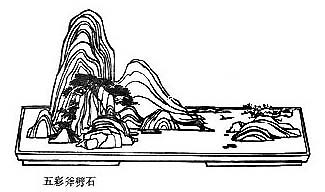詩
經
Shi Jing 
 – Le Canon des Poèmes
– Le Canon des Poèmes
Le plus ancien recueil connu de poésie chinoise, plus de trois cents chansons, odes et hymnes. Tr. Legge (en) et Granet (fr, incomplète).
Shijing II. 4. (189)
| 爰 居 爰 處 爰 笑 爰 語 |
西 南 其 戶 |
似 續 妣 祖 築 室 百 堵 |
無 相 猶 矣 |
兄 及 弟 矣 式 相 好 矣 |
如 竹 苞 矣 如 松 茂 矣 |
秩 秩 斯 干 幽 幽 南 山 |
斯 干 |
||
| 噲 噲 其 正 噦 噦 其 冥 |
殖 殖 其 庭 有 覺 其 楹 |
如 翬 斯 飛 君 子 攸 躋 |
如 鳥 斯 革 |
如 跂 斯 翼 如 矢 斯 棘 |
君 子 攸 芋 |
風 雨 攸 除 鳥 鼠 攸 去 |
約 之 閣 閣 椓 之 橐 橐 |
斯 干 |
||
| 維 虺 維 蛇 女 子 之 祥 |
維 熊 維 羆 男 子 之 祥 |
大 人 占 之 |
維 虺 維 蛇 |
吉 夢 維 何 維 熊 維 羆 |
乃 寢 乃 興 乃 占 我 夢 |
下 莞 上 簟 乃 安 斯 寢 |
君 子 攸 寧 |
斯 干 |
||
| 無 父 母 詒 罹 |
無 非 無 儀 唯 酒 食 是 議 |
載 衣 之 裼 載 弄 之 瓦 |
乃 生 女 子 載 寢 之 地 |
室 家 君 王 |
其 泣 喤 喤 朱 芾 斯 皇 |
載 衣 之 裳 載 弄 之 璋 |
乃 生 男 子 載 寢 之 床 |
斯 干 |
||
By the graceful sweep of these banks,
With the southern hill, so calm in the distance,
[Has the palace arisen], firm as the roots of a clump of bamboos,
[With its roof] like the luxuriant head of a pine tree.
May the brothers [here],
Be loving among themselves,
And have no schemings against one another !
Having entered into the inheritance of his ancestors,
He has built his chambers, five thousand cubits of walls,
With their doors to the west and to the south.
Here will he reside ; here will he sit ;
Here will he laugh ; here will he talk.
They bound the frames for the earth, exactly over one another ;
Tuo-tuo went on the pounding ; –
Impervious [the walls] to wind and rain,
Offering no cranny to bird or rat.
A grand dwelling is it for our noble lord.
Like a man on tip-toe, in reverent expectation ;
Like an arrow, flying rapidly ;
Like a bird which has changed its feathers ;
Like a pheasant on flying wings ;
Is the [hall] which our noble lord will ascend.
Level and smooth is the court-yard,
And lofty are the pillars around it.
Pleasant is the exposure of the chamber to the light,
And deep and wide are its recesses ; –
Here will our noble lord repose.
On the rush-mat below, and that of fine bamboos above it,
Here may he repose in slumber !
May he sleep and awake,
[Saying] ' Divine for me my dreams.
What dreams are lucky ?
They have been of bears and grisly bears ;
They have been of cobras and [other] serpents. '
The chief diviner will divine them.
The bears and grisly bears,
Are the auspicious intimations of sons.
The cobras and [other] serpents,
Are the auspicious intimations of daughters.
Sons shall be born to him : –
They will be put to sleep on couches ;
They will be clothed in robes ;
They will have sceptres to play with ;
Their cry will be loud.
They will be [hereafter] resplendent with red knee-covers,
The [future] king, the princes of the land.
Daughters shall be born to him : –
They will be put to sleep on the ground ;
They will be clothed with wrappers ;
They will have tiles to play with.
It will be theirs neither to do wrong nor to do good.
Only about the spirits and the food will they have to think,
And to cause no sorrow to their parents.
Legge 189

Le Canon des Poèmes – Shi Jing II. 4. (189) – Chinois on/off – Français/English
Alias Shijing, Shi Jing, Book of Odes, Book of Songs, Classic of Odes, Classic of
Poetry, Livre des Odes, Canon des Poèmes.
Le Canon des Poèmes, Les Entretiens, La Grande Étude, Le Juste Milieu, Les Trois Caractères, Le Livre des Mutations, De la Voie et la Vertu, 300 poèmes Tang, L'Art de la guerre, Trente-six stratagèmes
Bienvenue, aide, notes, introduction, table.
Index – Contact – Haut de page
